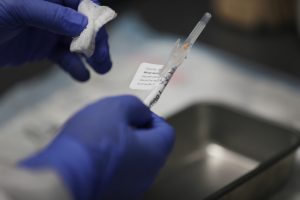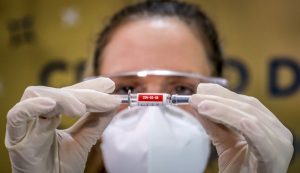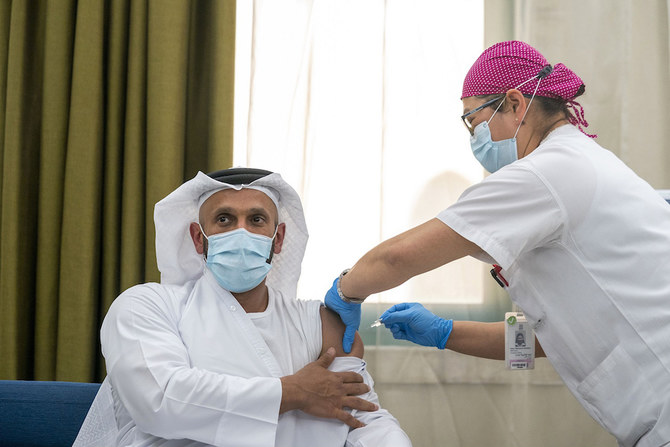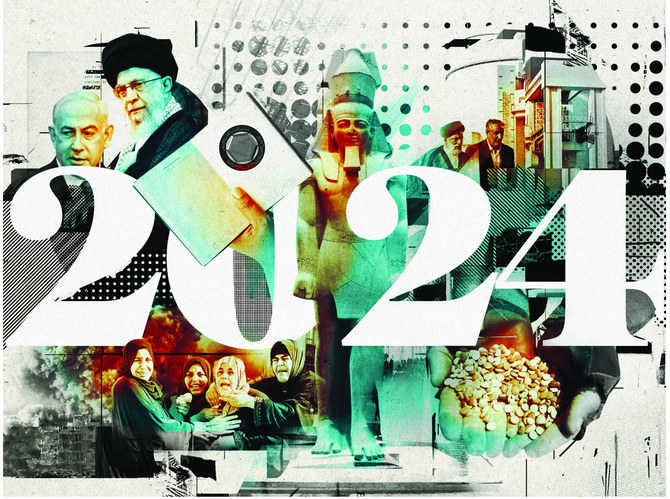DUBAI: As scientists and drug companies race to develop a vaccine for COVID-19, extensive efforts are going on at many different levels to battle the pandemic.
What has mainly grabbed the headlines so far are efforts by pharmaceutical laboratories to come up with successful treatment options, vaccines in particular. Behind the scenes, complex negotiations are under way to buy a working vaccine as soon as it becomes available, according to experts.
Several countries, including some in the Middle East, are involved in talks with leading companies and research institutes engaged in various phases of trials.
The World Health Organization (WHO), meanwhile, is engaged in preparatory talks with countries on ways of ensuring prompt and fair distribution once a vaccine becomes available.
Should ongoing efforts succeed over the next few months, experts say, they would be the quickest in the history of vaccines.
All phases of vaccine trials are on the “fast track,” according to Dr. Abdinasir Abubakar, head of the Infectious Hazard Management Unit at WHO’s regional office in Cairo.
“There are three or four vaccines in Phase III trials, and we might be able to get one by the end of the year, or the beginning of next year,” he told Arab News. “That is really very fast compared to the normal procedure with vaccines, which normally take 18 months or longer.”
Research is being fast-tracked for many reasons. “The burden of COVID-19 on both the social and economic fields is significant. We have not seen such a thing before,” Abubakar said. “Secondly, there is a political commitment, and, third, so much funding. Governments are actually pouring resources into the vaccine development and that is what makes the difference.”
Based on a protocol agreed by the international community, WHO is playing a “major role” in coordinating efforts of different groups, starting from registering their initiatives to producing a vaccine, according to Abubakar. “At the end of the day, we don’t want to come up with a vaccine that does not follow international standards and guidelines.”
WHO is organizing periodical meetings on COVID-19 vaccine trials, drugs and diagnostic tools, and offers a database and platform for all involved companies and entities, he explained.
More than 170 companies are in the vaccine race, including nearly 135 in the pre-clinical trials phase, 30 in the first two phases, and six in the third phase. Companies from Taiwan and India have recently joined the fray.
The third phase usually takes longer and typically ranges between one to several years because of the high number of volunteers, usually in the tens of thousands, and the several tests involved. Volunteers are randomly assigned to take either the vaccine or a placebo — a “fake” vaccine that could be just saline or a sterile buffer in an injection.
Both groups of subjects are continuously tested for antibodies and checked for any side effects, according to Khawla Abu-Izza, owner of Bayview CMC Consulting in Berkeley, California.
Phase III trials will also determine the duration of the protection the vaccine will offer, the Arab-American consultant told Arab News.
“If the subjects who took the vaccine are more protected for the first couple of months, but at four or six months we don’t see a difference between those on the active and those on the placebo, that means the protection is only short-lived,” she said.
The companies at the forefront of COVID-19 vaccine development include Moderna (US), BioNTech (Germany) in collaboration with Pfizer (American/Multinational), AstraZeneca in collaboration with Oxford University (UK), and Sinova (China). The first three announced phase III trials in July, after the Chinese company.
“It is difficult to predict which one will make it to the finish line first, but it’s almost certain that companies have agreements with regulatory agencies on interim early analysis of partial data well before completion of the entire study,” Khawla said.

This means major regulatory bodies, including the US Food and Drug Administration (FDA) and the European Medicines Agency, could allow a shortening of the review period to a few months or to grant “conditional approval” as soon as they see “clinical results” without waiting for the full new drug application (NDA) to be submitted.
Since the search for drugs to treat COVID-19 requires fewer studies and because of the smaller size of clinical studies and shorter treatment or observation periods, Khawla said, “We may see more drugs approved for the treatment of COVID-19 before we see a successful approved vaccine.”
Another “most likely” scenario, according to her, is that more than one vaccine will be approved back to back.
“Vaccine companies will have more than one manufacturing site. Typically, it’s two sites; one in North America and one in Europe, or one in a Western country and another in Asia (China, India or Korea),” she said. “Japan typically likes to have drugs and vaccines for the local market manufactured within the country. So, companies try to find Japanese manufacturing partners. The same is true for China, but in this case, China is developing its own vaccine and may not need any US- or EU-developed vaccines.”
Questions such as how much the companies can produce and who would be the first recipients will become important, as manufacturers cannot cover the needs of the world’s 7 billion people at once. Depending on the number of production lines, experts say the optimistic scenario is between 240 million and 400 million doses a year in the early stages.
“I could see 50 percent of the production reserved for the countries developing the vaccine,” Belal Zuiter, senior consultant at Cambridge Pharma Consultancy in London, told Arab News. Countries severely affected by COVID-19 and those containing vulnerable groups can be expected to receive priority, Zuiter said, adding that Arab countries would not necessarily be low on the priority list.
Many nations, including Arab countries with strong relations with potential producer states, have begun talks on obtaining the vaccine. “I know that most ministries of health have had talks with Moderna and AstraZeneca to book their quantities,” Zuiter said. “I think the Arab world will have enough doses within the first two or three months after a vaccine is produced.”
While governments will be responsible for distributing the vaccine, manufacturers, NGOs and philanthropist groups will have important roles to play. “There are two big groups (working with WHO), Gavi and CEPI,” Abubakar told Arab News. “Our three organizations are working together not only to coordinate the production of an effective vaccine, but also to ensure equitable distribution.”
Gavi, the Vaccine Alliance, is a public-private partnership established in 2000 to help vaccinate half of the world’s children. Among its members are developing and donor countries, the World Bank and the Bill and Melinda Gates Foundation. CEPI, the Coalition for Epidemic Preparedness Innovations, is a partnership between public, private, philanthropic and civil organizations launched at Davos in 2017 to develop vaccines and stop epidemics.
WHO, Gavi and CEPI established COVAX, a facilitation mechanism for countries, producers, manufacturers and users, according to Abubakar. While some countries can engage directly with the manufacturers, others cannot because of lack of cash. COVAX handles negotiations with manufacturers. Discussions over prices have, he said, already started between potential producers and low- and middle-income countries.

“The idea behind COVAX is just to make sure all countries, whether rich or middle-income and low-income, will be able to access at least enough supplies of the vaccine for priority groups,” he told Arab News.
WHO is helping governments to prepare the regulatory groundwork for the vaccine and to put in place policies and necessary systems for widespread distribution.
“Remember, this vaccine is not for everyone, priority will be given to high-risk groups,” Abubakar said.






















